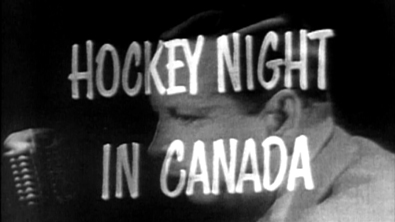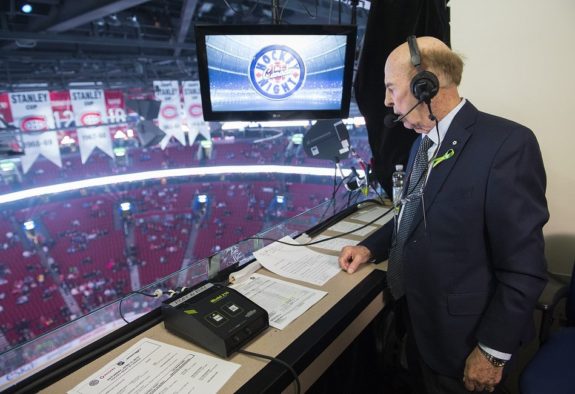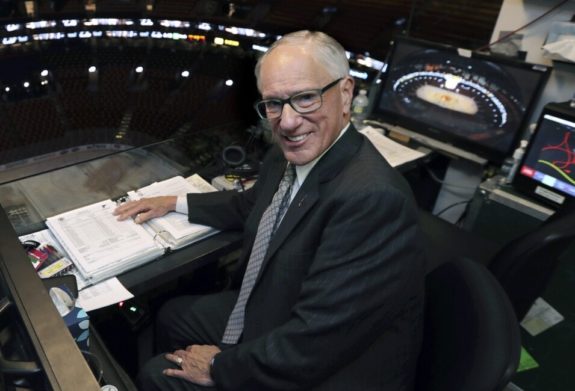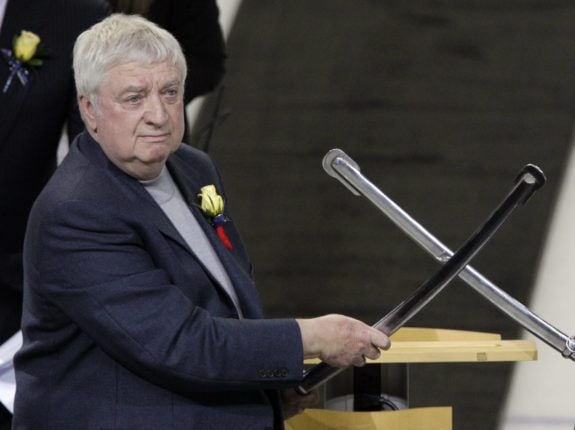“Good evening Canada, and hockey fans in the United States and Newfoundland!”
If you listened to the early days of the Canadian Broadcasting Corporation (CBC), those words were more than a programme’s introduction, they signified the beginning of a cultural institution and English Canada’s love affair with the Toronto Maple Leafs. Like the Los Angeles Dodgers’ Vin Scully, Foster Hewitt was most recognizable as the “voice of the Toronto Maple Leafs” and the voice of hockey in Canada. So iconic was Hewitt that his innovative phrasings have entered the hockey broadcasting lexicon (“He shoots, he scores!”). His voice helped transform the Maple Leafs into the cultural force they remain today.
Related: Sedins’ Hall of Fame Credentials
Although not one to admit it – he famously said in his autobiography, “I was well aware that the fans were more interested in the excitement and outcome of the game than they were in who told the story” – Hewitt nevertheless became a cultural phenomenon when the CBC was founded in 1936 and began to air National Hockey League games across Canada with him at the helm. His time with the CBC marked the beginning of a relationship seldom seen today when a broadcaster is so deeply identified with a franchise that nearly all fans have a memory of him.
Generational Talents
Many followed in Hewitt’s footsteps to become hockey broadcasters who were regarded as icons in their own right. When the CBC’s flagship Hockey Night in Canada moved to live television in 1952, broadcasters like Danny Gallivan and Dick Irvin became household names in the following decade and served as the English-language voices of the Montréal Canadiens for 28 years.

Irvin continued to call Canadiens’ games in various capacities from when Gallivan retired in 1984 to when he himself retired in 1999. The void left by these titans was quickly filled by Bob Cole and Harry Neale, two equally memorable broadcasters. Cole’s excitable “Oh baby!” is one of the most enduring catchphrases in sports broadcasting, and his signature style earned him the nickname “the Soundtrack of Saturday Night.”

Broadcasters of Cole’s calibre are not limited to Canada. The National Broadcasting Corporation’s (NBC) NHL coverage is led by Mike “Doc” Emrick, well-known for his eloquent vocabulary and encyclopedic knowledge of the game. He remains one of the few colourful broadcasters on television, while the remainder of them have moved to or seem more suited to radio.

His collection of 153 on-ice descriptors has been called the most extensive in sports, and his ability as a wordsmith has been praised even by those outside the NHL. It’s been said that the only thing that has kept Emrick outside of the broadcasting pantheon is that hockey isn’t big in the USA.
Erase/Replace
In the fall of 2013, the CBC announced it had licensed the rights to NHL coverage to media behemoth Rogers Communications as part of a 12-year, $5.23 billion deal which divided hockey coverage in Canada across the Rogers networks. While it seemed promising that NHL coverage would become increasingly widespread and inclusive for teams that had been neglected previously, it also inadvertently led to the decline of some of Canada’s iconic hockey broadcasters. Cole appeared on HNIC less and less frequently until his retirement in April 2019.
The revered position of Cole among Canada’s broadcasting elite seemed not to bother Rogers all that much, as they brought in replacements like Paul Romanuk to take over Cole’s lofty position, a decision which can at best be described as divisive.
In 2017, the year that Cole’s role with HNIC was cut drastically (he only worked the first two rounds of the playoffs and was not calling a Stanley Cup Final for the first time since 1983), his replacement, Romanuk, was subject to a barrage of critical tweets, with one describing him as a “broadcasting vampire” who “sucks all the energy and excitement from the game.” Cole’s legendary skill and reputation made him tough to replace.
It seems to me that the era of great television commentary is at or nearing an end, as iconic voices are phased out, pushed aside or have lost the appeal of fans in favour of flashy imagery and constant visual engagement.
Radio: Where the Voices Remain Pure
There is one media where voices are still iconic: the radio. Classically trained personalities permeate hockey radio, as these 2020 Playoffs have demonstrated. Anyone who’s followed the Tampa Bay Lightning has heard the joyful screams of Dave Mishkin, alongside his “SCCCOOORRRREEEEE!!!!!!”
Outside the playoffs, the Pittsburgh Penguins’ Mike Lange is among the great broadcasters; who can forget the litany of excellent “Lange-isms”? From “Scratch my back with a hacksaw!” and “Get in the fast lane, grandma, the bingo game’s ready to roll!” to the iconic line uttered after the Penguins won their first Stanley Cup: “Lord Stanley, Lord Stanley, give me the brandy!” With almost 50 years on the air calling the same team, he is among the select few who have managed to parlay their unique style into nearly a half-century of broadcasting.
Among the Langian broadcasters and one of the most well-known is the Buffalo Sabres’ Rick Jeanneret, another seemingly eternal presence in hockey broadcasting. His career with the Sabres began in 1971-72 and continued even through his treatment for throat cancer in 2014. It seemed as though Jeanneret had a goal call for each Sabres star, from Alexander Mogilny’s “Alexander the Great” to Pat LaFontaine’s Christmastime “Fa-la-la-la-la-la-LaFontaine”, his calls have been immortalized in various top-10 videos.

The culture and structure of radio allow broadcasters like Jeanneret, Lange, and Mishkin to thrive, as the lack of visual stimulation requires a certain colourful personality to keep the listeners entertained. Personally, I prefer hockey on the radio, as there are fewer distractions than watching on television and my desire for colourful language is fulfilled in earnest. There’s also something strangely romantic about experiencing the game the way people did in its formative years, when the voice was the spectacle and everyone gathered around the radio to listen.
Related: Senators’ Best of All-Time
It’s almost as if one can experience the game’s history through the radio; the voices of Mishkin, Lange, and Jeanneret are the direct link to Hewitt and hockey broadcasting’s early pioneers. Lange and Jeanneret are both recipients of the Hockey Hall of Fame’s Foster Hewitt Memorial Award for outstanding achievement in broadcasting, and it seems to me it’s only a matter of time before Mishkin is as well. I think Hewitt would be proud of the culture he helped create, and in knowing that radio broadcasting is in good hands.